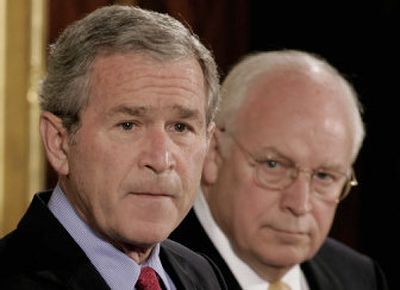Bush signs bill creating military tribunals

WASHINGTON – President Bush signed new legislation Tuesday providing for the detention and prosecution of terrorism suspects, and the Justice Department moved immediately to request the dismissal of dozens of lawsuits filed by detainees challenging their incarceration.
Bush signed the legislation in an elaborate East Room ceremony, calling it a “vital tool” in the administration’s war on terrorism, while Republican Party officials immediately unleashed campaign broadsides, charging that the measure’s Democratic critics advocate freeing terrorists.
The new law thus became both part of the administration’s final campaign push to preserve its congressional majority in the midterm election and the beginning of a new chapter in fashioning a judicial process for those captured around the world in U.S. military and counterterrorism operations.
The law is bound to generate new and contentious legal challenges that likely will leave U.S. policies on detainees in an uncertain state. Beside the request that federal courts throw out detainees’ lawsuits, judges also will be asked to decide new legal questions that again may end up before the Supreme Court. Meanwhile, human rights groups said it is far from clear how the new law will be implemented, and the CIA has asked Justice Department lawyers to review interrogation guidelines.
The legislation sets new ground rules for the CIA to conduct interrogations and allows for the prosecution of terror suspects before military tribunals. Bush said the measure enables the U.S. to bring to justice the coordinators of the Sept. 11 attacks and allows the CIA to continue an aggressive interrogation program that he said had disrupted additional terror strikes.
“With the bill I’m about to sign, the men our intelligence officials believe orchestrated the murder of nearly 3,000 innocent people will face justice,” Bush said, sitting at a table with a sign posted on the front that said “Protecting America.” The president said he signed the new law “in memory of the victims” of Sept. 11.
He was surrounded by military officers, members of his Cabinet and lawmakers who helped pass the bill. Several dozen protesters chanted slogans outside in the rain branding the measure an affront to civil liberties.
The enactment of the law – four months after the U.S. Supreme Court said that an earlier scheme for handling terror cases violated U.S. law – was good news for Bush as casualties have mounted in Iraq and his handling of the war on terror has come under intensifying criticism.
The signing ceremony was part political rally for a GOP that is struggling to retain control of Congress three weeks before a pivotal midterm election. Republican leaders said the legislation showed that they were a party of strength and assailed Democrats for not supporting the measure.
“The Democratic plan would gingerly pamper the terrorists who plan to destroy innocent Americans’ lives,” House Speaker J. Dennis Hastert, R-Ill., said.
The Justice Department moved swiftly to enforce one of the law’s most controversial provisions. Within two hours of the signing ceremony, department lawyers notified the U.S. appeals court in Washington that the new law had been enacted, “eliminating federal court jurisdiction.” The court is overseeing dozens of lawsuits filed on behalf of prisoners held at the U.S. military prison at Guantanamo Bay, Cuba.
Lawyers for the detainees responded with their own filing Tuesday, requesting time to present legal arguments that the new law violated the U.S. Constitution. The appeals court took no immediate action.
The administration has identified about two dozen suspects it plans to put on trial, including accused Sept. 11 mastermind Khalid Shaikh Mohammed, who, along with 13 other high-profile suspects, was recently transferred from CIA custody to Guantanamo Bay.